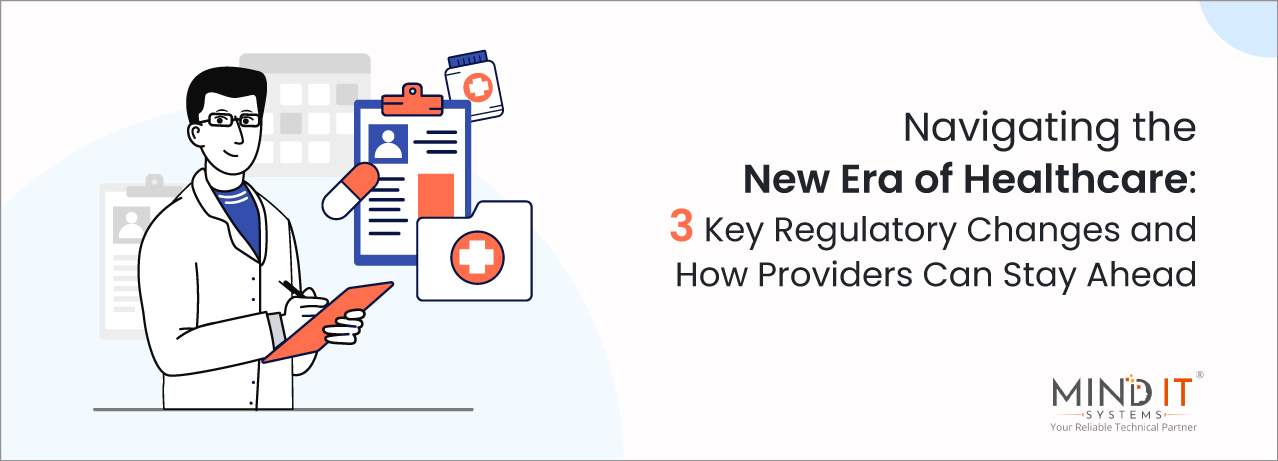
Navigating the New Era of Healthcare: 3 Key Regulatory Changes and How Providers Can Stay Ahead
Introduction
Healthcare regulations have shifted from being a footnote to becoming the driving force behind how care is delivered and managed. The healthcare landscape is evolving rapidly, and 2025 will introduce regulatory changes that will redefine how data flows, how care is delivered, and how trust is built between providers and patients. Today, compliance is not just about following the rules—it’s about building resilience, enhancing efficiency, and positioning your organization to stay ahead of the curve.
In this blog, we’ll break down three key regulatory changes and provide actionable strategies for healthcare organizations to stay compliant and remain competitive in this changing environment.
Let’s get started.
Contents
3 Key Healthcare Regulatory Changes Redefining Healthcare
Let’s take a closer look at three key regulatory changes that will reshape the future of healthcare. Understanding these shifts will keep you compliant and position your organization to thrive in a rapidly evolving healthcare landscape.
1. Interoperability & Data Exchange: Breaking Down Barriers to Better Care
As patient data becomes a key asset, the demand for seamless data exchange has never been greater. Regulatory changes are now making interoperability a must-have, not just a priority. With 78% of healthcare providers identifying interoperability as a top goal, staying ahead of the curve is more important than ever. The new regulations require that patient data be exchanged in real-time and securely across various systems, enhancing both patient care and operational efficiency.
Solutions to Stay Ahead:
- Implement FHIR Standards: Collaborate with healthcare software partners to integrate Fast Healthcare Interoperability Resources (FHIR) standards, enabling smooth data connectivity across different systems.
- Embrace Open API Integrations: Invest in healthcare solutions with open API capabilities to ensure seamless data sharing and operational efficiency.
- Cloud-Based Integration: Consider moving to the cloud for better scalability and accessibility, allowing real-time data sharing regardless of the healthcare provider’s location.
Business Impact:
- Boosted Efficiency: Breaking down data silos results in a 30% reduction in operational inefficiencies for healthcare providers.
- Improved Patient Care: Complete and up-to-date patient records lead to more informed decision-making and coordinated care.
- Market Growth: The interoperability market is projected to grow significantly, highlighting the increasing need for interconnected healthcare systems, expected to reach $14.06 billion by 2029.
Are you prepared for the regulatory changes? Let us guide you toward compliant, efficient, and patient-centered solutions.
2. Prior Authorization Reform: Speeding Up Care with Automation
The prior authorization (PA) process has long been a bottleneck in patient care, with 35% of providers reporting that delays in PA lead to longer wait times. Recent regulatory reforms are designed to streamline and automate these processes, significantly reducing delays, administrative burden, and ultimately enhancing patient care.
Solutions to Stay Ahead:
- Automate with AI: Leverage AI-driven solutions to automate the prior authorization workflow, cutting approval times by up to 40%.
- Integrate with Insurer Systems: Use platforms that natively support real-time connectivity with insurers to speed up approvals.
- Streamline PA Workflows: Standardize the prior authorization workflows to align with new regulatory standards, improving transparency and reducing the manual effort needed for approvals.
Business Impact:
- Faster Treatment Delivery: Automation reduces delays, improving access to care for patients.
- Cost Reduction: By automating PA, healthcare providers can lower administrative costs by up to 25%.
- Enhanced Patient Experience: Faster approvals result in a more positive patient experience and increase overall patient satisfaction and loyalty.
3. AI & Data Privacy: The Growing Need for Ethical AI Use
AI’s integration into healthcare is accelerating, from diagnostics to operational management. But with this growth comes an increasing need for responsible AI use. A significant 70% of healthcare executives believe AI will revolutionize patient care, yet concerns around data privacy and ethical AI usage remain prevalent. New regulations now require AI models to meet strict standards for transparency, fairness, and compliance with data privacy laws.
A Statista survey from 2024 revealed that 83% of patients are more likely to trust AI-driven healthcare tools when providers are transparent about data use and privacy protections.
Solutions to Stay Ahead:
- Adopt Ethical AI Practices: Work with trusted healthcare software providers to integrate AI solutions, prioritizing transparency, fairness, and ethical use.
- Ensure Data Privacy Compliance: Design AI solutions that safeguard patient data, adhering to privacy regulations like HIPAA and GDPR.
- Focus on Patient-Centric AI: Use AI to enhance diagnostic accuracy, personalize treatment plans, and reduce human errors—all while maintaining ethical standards.
Business Impact:
- Building Trust: Ethical AI practices boost patient trust, with 83% of patients more likely to trust AI, which ensures privacy and transparency.
- Regulatory Compliance: Adopting ethical AI practices reduces the risk of legal challenges, shielding your organization from costly fines.
- Improved Outcomes: AI adoption has led to a 20% reduction in diagnostic errors, significantly improving patient care.
Ready to turn these regulatory challenges into strategic opportunities? Let’s work together to ensure your healthcare organization stays ahead of the curve.
Turning Compliance into a Catalyst for Growth
Regulatory compliance in healthcare doesn’t have to be seen as a burden—it’s an opportunity for growth. By proactively embracing regulatory changes, healthcare organizations can transform challenges into opportunities for improved patient care, streamlined operations, and increased profitability.
The future of healthcare is digital, and compliance is the key to unlocking that future. The time to act is now. Partnering with the right technology provider can make all the difference in staying ahead of regulations and turning them into a strategic advantage.
As the healthcare landscape evolves, your response today can define your success tomorrow.
What’s Your Next Step?
Navigating change requires more than adaptation—it demands innovation. At Mind IT Systems, we specialize in healthcare software solutions designed to help you thrive in this evolving regulatory landscape. Whether you’re improving interoperability, automating prior authorizations, or ensuring ethical AI use, our tailored solutions empower you to stay compliant while gaining a competitive edge.
Are you ready to turn compliance into a strategic advantage? Reach out to us today, and let’s explore how we can help your organization stay ahead in the dynamic healthcare ecosystem.
Get ahead with more healthcare resources below:
Share this post
About the Author

Sujoy Roy
(Head – Digital Marketing)
From my teenage time, I had a quench to solve problems and loved leadership. Starting my career in relation management, ignited my passion for managing people. While managing I realized technology needs to be incorporated to keep pace with the changing world & do my work efficiently.

